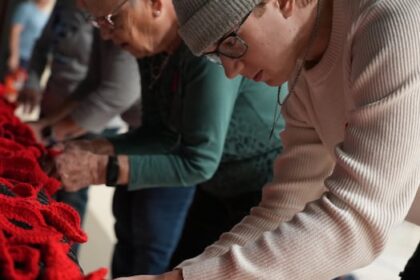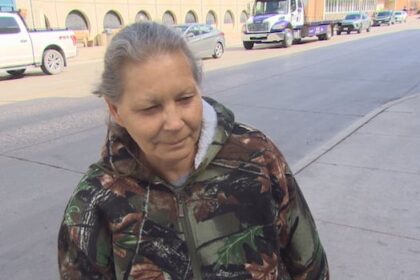Two First Nations met with media Wednesday in Winnipeg to outline a class action lawsuit they have launched against the federal government over the “housing crisis on reserve.” “Canada has deliberately underfunded housing on reserves, while simultaneously isolating First Nations and imposing restrictions on their ability to provide housing for themselves,” said the statement of claim filed in 2023. “The resulting catastrophe for First Nations and their members was not only predictable, it was the Defendant’s intended result. “Throughout, Canada sought to weaken First Nations, diminish their numbers, and ultimately force the assimilation of their members.” According to leaders from St. Theresa Point Ansininew and Sandy Lake First Nation, this is the first case to “consider the federal government’s obligation to provide adequate housing on reserve.” They said 100 First Nations have opted into the class action. “The Crown forced us to move onto reserve land that it deemed economically invaluable, and packed us in like a can of sardines. We were set up to suffer. The housing crisis on reserve is a national shame,” said Raymond Flett, chief of St. Theresa Point Ansininew. “Those who are forced to leave the reserve to try to secure adequate housing also suffer, as they experience targeted violence and all too often die prematurely in the city.” According to the First Nations, Canada has “deliberately underfunded the construction and maintenance of homes in First Nations,” but at the same time, “imposed restrictions on First Nations’ ability to build and finance their own homes. The resulting housing shortage is a man-made catastrophe, which has overwhelmed northern and remote First Nations. “The housing conditions in these First Nations more closely resemble developing countries than the rest of Canada,” said a statement released by the parties. A rally in Winnipeg on Wednesday in support of a class action lawsuit against Canada. Photo: Veronica Blackhawk/APTN. Flett said the average house in St. Theresa Point Ansininew and Sandy Lake First Nations have 15 to 20 people and a majority of the homes have mould. “While Canada has repeatedly promised to address the lack of housing in First Nations, it has failed to deliver. Canada’s refusal to fulfill its obligations to First Nations is the latest chapter of its longstanding history of forcing First Nations people from their lands,” said a statement from communities. “First Nations have been left with no choice but to turn to the Courts because they are in an urgent state of crisis. The housing shortage on reserve is directly linked to First Nations people experiencing poor physical and mental health, which includes infant mortality rates that are approximately triple the national average and a youth suicide epidemic.” In March 2024, APTN reported on Auditor General Karen Hogan’s report where she chastised the federal government and the Canada Mortgage and Housing Corporation (CMHC) for “hopelessly falling behind” in funding First Nations housing on reserve. Her audit found that because CMHC relied on data from the 2001 Census, the effect of not updating the information “resulted in First Nations in Alberta, Saskatchewan, and Manitoba being significantly underfunded and therefore not receiving their equitable share of funding.” Between 2008 and 2023, Alberta was underfunded by $141 million, Saskatchewan by $72.92 million and Manitoba by $60 million, according to the AG’s report, for a total of $274 million. Read More: First Nations outside the Prairies likely to see housing money shrink once new formula negotiated Hogan also reported that people living on reserves were four times more likely to live in crowded conditions and six times more likely to be living in a home that needed major repairs compared to non-Indigenous people. “The class action alleges that Canada has breached its obligations to First Nations and their members by failing to ensure that reserves have adequate housing. Canada is alleged to have been negligent, breached its fiduciary duties, breached the honour of the Crown, and breached several rights under the Canadian Charter of Rights and Freedoms,” the nations said. The class action seeks “$5 billion, or such sum as the Court deems appropriate, for breaches of its fiduciary duties and negligence.” The claim is also asking for “punitive damages in the amount of $100 million.” $100 million compensation and an order that the federal government comply with its obligation to provide adequate housing on reserve. The hearing wraps up on Thursday in Winnipeg. Continue Reading
First Nations seek $5.1B in compensation over housing crisis that is national shame

Leave a Comment









